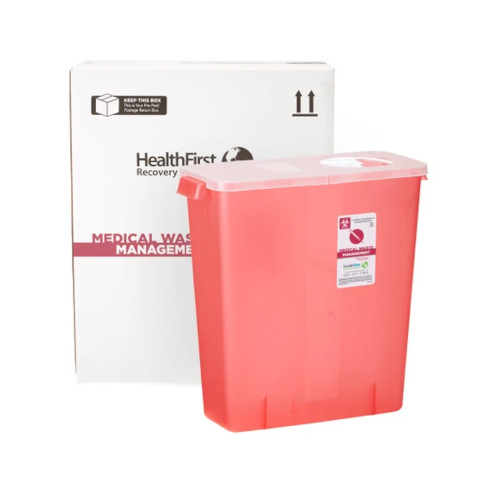Navigating Safety: The Necessary Overview to Medical Waste Disposal Best Practices
Navigating Safety: The Necessary Overview to Medical Waste Disposal Best Practices
Blog Article
Exploring Various Waste Disposal Options for a Cleaner Environment
In the pursuit of a cleaner environment, the monitoring of waste disposal has actually arised as a crucial focal factor for sustainable advancement. With a plethora of waste disposal alternatives offered, ranging from conventional garbage dump approaches to ingenious waste-to-energy technologies, the selection of how we manage our waste has significant implications for our earth's well-being.
Recycling Approaches
Implementing efficient recycling approaches is critical in reducing waste and advertising sustainability in our setting. Recycling includes the procedure of transforming waste materials right into multiple-use challenge stop unneeded disposal. One of one of the most usual recycling approaches is worldly recuperation, where products like paper, glass, steel, and plastic are accumulated, sorted, and refined to produce brand-new products. This process not only saves natural sources yet also minimizes power intake and greenhouse gas discharges related to generating new materials from the ground up.
An additional vital recycling approach is composting, which includes disintegrating organic waste like food scraps and yard trimmings right into nutrient-rich dirt. By integrating these various reusing methods into our waste monitoring methods, we can substantially decrease our ecological impact and move in the direction of a much more sustainable future.

Composting Techniques
Reliable waste management techniques, such as recycling approaches, pave the method for a cleaner setting, and now, shifting the focus to 'Composting Techniques', we discover lasting ways to disintegrate organic waste for ecological benefit. medical waste removal near me.
Composting is an all-natural procedure that transforms natural waste, like food scraps and yard trimmings, right into a nutrient-rich soil change. The secret to effective composting lies in producing the appropriate equilibrium of green materials, such as vegetables and fruit scraps, and brown products, like dried out fallen leaves and twigs. These products decompose with the assistance of microorganisms, breaking down the waste into useful garden compost.
Conventional backyard composting entails layering natural products in a container or stack and consistently transforming the combination to freshen it. By making use of composting methods, we can minimize the amount of waste sent to garbage dumps while producing a helpful item for enhancing soil and sustaining plant development.
Incineration Advantages And Disadvantages
Incineration, as a garbage disposal technique, presents both benefits and downsides that merit careful consideration in the realm of sustainable waste management techniques. On the silver lining, incineration can considerably reduce the quantity of waste, minimizing the need for land fill area and potentially reducing greenhouse gas emissions. Incineration likewise enables for the recuperation of power with the generation of electrical power or heat, adding to resource recovery. The process can be used to ruin hazardous compounds, using a safe technique for dealing with particular types of waste that might pose threats to public health and the environment if left unattended.
Additionally, the high preliminary investment and operational costs of incineration centers pose financial challenges, making it a less cost-effective alternative contrasted to other waste administration approaches. Mindful tracking and policy are necessary to reduce these unfavorable influences and maximize the benefits of incineration as part of a thorough waste management method.
Garbage Dump Administration Methods
Landfills play a critical duty in waste monitoring and ecological preservation by supplying a containment system for the disposal of solid waste products. Effective garbage dump monitoring approaches are necessary to minimize environmental impacts and make sure the long-lasting sustainability of these waste disposal sites. One vital method appertains waste compaction to optimize making use of offered space within the landfill (click here). By compacting the waste, the quantity is reduced, permitting even more waste to be fit in time.
Additionally, the implementation of everyday cover methods is vital in minimizing smells, protecting against trash, and decreasing the attraction of parasites. Treatment the disposed waste at the end of every day helps to have odors and avoid potential ecological contamination. Furthermore, the monitoring of land fill gas discharges and leachate degrees is essential in guaranteeing that ecological standards are fulfilled and that any type of prospective risks to bordering ecological communities are lessened.

Waste-to-Energy Technologies
Among the innovative approaches to waste administration entails using Waste-to-Energy innovations to convert strong waste right into useful power sources. Waste-to-Energy (WtE) innovations include a range of procedures that intend to extract power from waste materials through thermal, chemical, or organic ways. This conversion process not only reduces the quantity of waste that ends up in landfills however additionally produces important power sources such as electrical power, heat, like it or biofuels.
Incineration entails melting waste at high temperatures to create heat and electrical power. Gasification converts waste right into a syngas, which can be used for power generation or chemical production.
Carrying out Waste-to-Energy modern technologies can assist reduce environmental issues related to standard garbage disposal techniques while at the same time giving a renewable resource source. Nevertheless, careful consideration needs to be offered to emissions control and guaranteeing the sustainability of feedstock materials for these modern technologies to be truly advantageous for a cleaner setting.
.jpg)
Conclusion
In final thought, checking out various waste disposal options such as reusing, composting, incineration, garbage dump monitoring, and waste-to-energy innovations is crucial for promoting a cleaner environment - click here. Each method has its very own benefits and challenges, but by utilizing a mix of these methods, we can work towards reducing the amount of waste that winds up in landfills and inevitably add to a more sustainable future for generations to find
With a wide variety of waste disposal alternatives offered, varying from traditional landfill approaches to cutting-edge waste-to-energy modern technologies, the choice of just how we handle our waste has far-reaching effects for our world's health. medical waste removal near me.Incineration, as a waste disposal technique, offers both advantages and negative aspects that warrant careful consideration in the realm of sustainable waste administration techniques.Garbage dumps play a critical role in waste administration and environmental preservation by giving a control system for the disposal of solid waste materials. By condensing the waste, the volume is minimized, permitting for even more waste to be suited over time
One of the innovative techniques to waste administration includes utilizing Waste-to-Energy innovations to transform solid waste into usable power resources.
Report this page